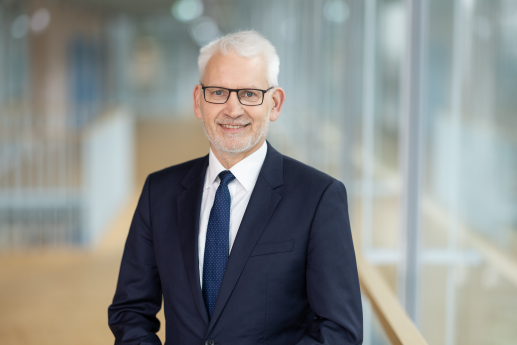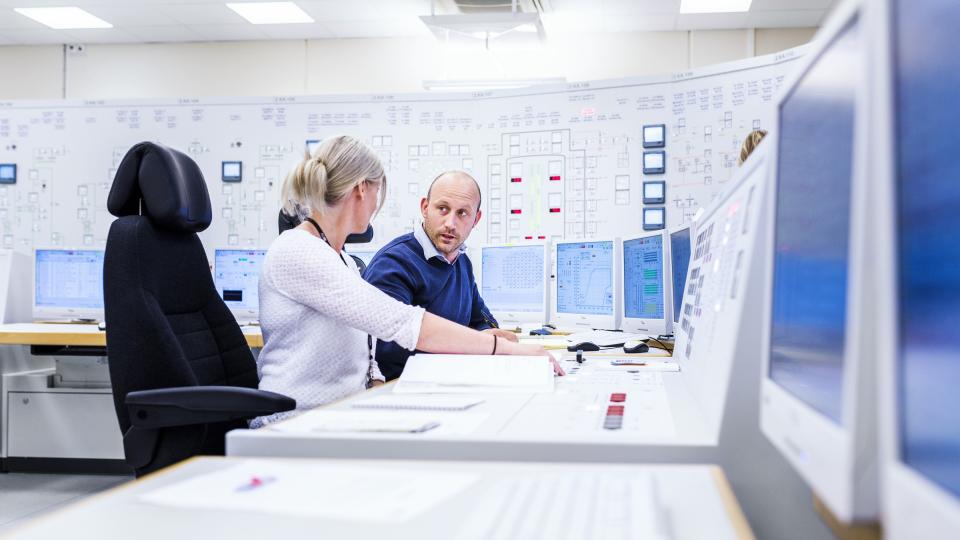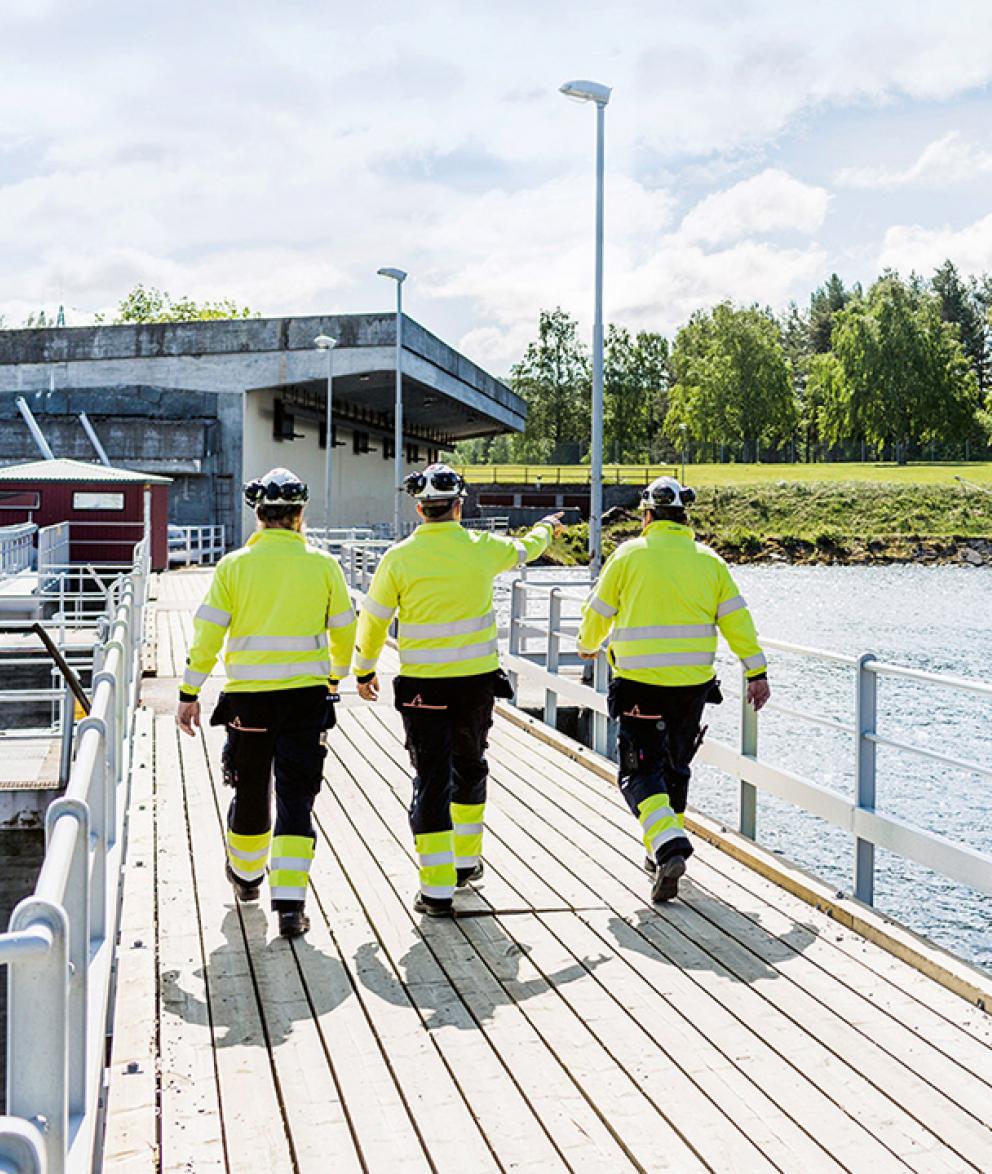.
Uniper strives to contribute to a more sustainable and decarbonized world and sees its purpose as to empower energy evolution. In March 2020, Uniper announced a new strategy which foresees gradual transformation into a greener company, while continuing to maximize Uniper’s value.
With the new strategy Empower Energy Evolution, Uniper is committed to become carbon neutral by 2050. Following the an-nouncement of the new strategy, Uniper presented its transition agenda for each of its reporting segments – European Generation, Global Commodities, and Russian Power Generation – and started strat-egy implementation.
.
Reduction in direct carbon emissions
Female Supervisory Board representatives
Combined TRIF
Reduction in sulphur dioxide emissions
Coal purchased from suppliers that signed up to the Bettercoal Code of Conduct
Trustbuilding dialogues with civil society organizations
Uniper ranked in the top 1 % of German companies

Mit noch ehrgeizigeren Zielen für unsere grüne Transformation bleibt die Nachhaltigkeit eine klare Triebfeder unserer neuen Strategie. Seit 2005 ist es uns gelungen, die direkten CO2-Emissionen europaweit um 71 % zu senken. Diese Leistung ist jedoch nur der Ausgangspunkt. Um schneller grüner zu werden, haben wir uns ehrgeizige Klimaziele gesteckt. Wir wollen bis 2040 CO2-neutral sein – 10 Jahre früher als bislang geplant. Bis 2035 planen wir die konzernweite CO2-Neutralität für die Scope 1 & 2 Emissionen. Bis 2030 wollen wir bereits einen signifikanten Teil dieses Weges schon erreicht haben und über 55% der CO2-Emissionen im Erzeugungsportfolio im Vergleich zu 2019 reduziert haben. Um das zu erreichen, werden wir bis 2029 aus der Kohleverstromung aussteigen – acht Jahre früher als bisher geplant. Um die grüne Transformation zu beschleunigen,werden wir bis 2030 über 8 Milliarden Euro investiert haben. Das ist mehr als eine Verdreifachung der durchschnittlichen Wachstumsinvestition der letzten drei Jahre.
Michael Lewis, Chief Executive Officer (CEO) und Chief Sustainability Officer (CSO) von Uniper
Our ESG ratings and rankings

It is always useful to find out how others think we’re doing and to learn from their feedback. Our sustainability performance is rated and ranked by a wide range of independent organizations around the world. We continually strive to improve our performance.
.
Equity Story

Five reasons why to invest in Uniper
- We promote the evolution of energy.
- We make our portfolio fit for the future.
- We focus on growth investments.
- We're working on a robust earnings mix for the future.
- We pay an attractive dividend.
.
ESG Strategy, Management and Disclosure
Climate change is one of the biggest challenges of today’s world. To overcome it, countries set targets to reduce emissions to reach the goals of the Paris agreement. Globally, 189 countries ratified or oth-erwise joined the agreement. In early 2020, the European Parliament approved a resolution increasing the EU’s climate ambition and aiming to reduce CO2 emissions by 55% by 2030 and reach climate neu-trality by 2050.
Uniper strives to contribute to a more sustainable and decarbonized world and sees its purpose as to empower energy evolution. In March 2020, Uniper announced a new strategy which foresees gradual transformation into a greener company, while continuing to maximize Uniper’s value.
With the new strategy, Uniper is committed to become carbon neutral by 2050. Following the an-nouncement of the new strategy, Uniper presented its transition agenda for each of its reporting seg-ments – European Generation, Global Commodities, and Russian Power Generation – and started strat-egy implementation.
Find out more in Uniper's annual report 2020.
Uniper will decommission almost 80% of its coal-fired power plant capacity in Germany by 2025. In line with the coal-phase out in the Netherlands and the United Kingdom, additional power plant capacity will be decommissioned. Moreover, Uniper targets to make its entire electricity generation in the EU CO2-neutral by 2035
Together with our majority shareholder Fortum, we further announced a joint interim target in December 2020 to reduce our total carbon emissions in Europe by at least 50% by 2030.
Looking further ahead, we intend for all of Uniper’s operations including those in Russia to be carbon-neutral by 2050 at the latest. These targets are fully in line with those of the Paris Agreement.
The company is examining how corresponding decarbonization solutions can be implemented in the long-term. This includes planned modernization projects in Russian gas-fired power plants, which will make a substantial contribution to increasing efficiency.
CO₂-free power supply is becoming an increasingly important part of Uniper's portfolio. Major contributions are already coming from European hydro and nuclear power plants as well as supply contracts (PPAs) from wind and photovoltaic projects in Europe. Uniper is also currently examining the commercial framework conditions for entering into the development, construction and operation of renewable energy plants.
Uniper is using its decades of experience in importing, trading, storing and selling natural gas to set the course for a hydrogen-based energy system. Uniper is one of the first German energy utilities to implement projects for the production of green hydrogen based on electrolysis processes.
In order to make a substantial contribution to the decarbonization of energy systems in the area of global commodity trading, Uniper is also working on developing global trade in climate-neutral gases and other energy carriers in the future.
Find out more in Uniper's Sustainability Report 2020.
Uniper has a Sustainability Strategic Plan (SSP), which describes how sustainability supports the Group’s business strategy and defines improvement targets for its ESG performance. The SSP was first published in February 2019 and has been updated in May 2020. Uniper's dedicated HSSE & Sustainability function tracks progress towards the SSP targets on a quarterly basis. The results are presented to the Management Board and all business functions. Starting with this SSP, Uniper aims to build on its potential for business growth, characterized by active management to minimize the main negative environmental and social impacts caused by its operations. The SSP targets are built around a set of long-term commitments that reflect core elements of Uniper's corporate culture and business strategy.
Find out more about Uniper's ESG commitments and targets in Sustainability Report 2020.
Uniper conducts a materiality assessment on an annual basis.
In 2020 Uniper identified seven topics as most material: 1. Secure, reliable and affordable energy supply; 2. GHG (Greenhouse gas) emissions; 3. Health and safety; 4. Fair and attractive employer; 5. Diversity and inclusion; 6. Governance and compliance; 7. Human rights along the value chain.
The materiality assessment adopted a two-dimensional approach that considered the economic, environmental and social impact of Uniper's business activities on the defined issues as well as the impacts of these issues on the company. The expectations of important stakeholder groups such as policymakers, competitors, non-governmental organizations and the financial market were taken into account as well. It was analyzed whether from their perspective the impacts could have a significant influence on the Group and third parties and the importance of the impacts for understanding the Group's current and future development.
Find out more about our materiality assessment in Sustainability Report 2020.
In 2020 Uniper responded to CDP’s sector-specific climate-change questionnaire. The questionnaire regarded Uniper’s performance in the 2019 calendar year. CDP, formerly known as the Carbon Disclosure Project, runs a global disclosure system for companies to improve awareness through measurement and disclosure of environmental data, climate risks and carbon management. CDP gave Uniper a “B” which is an improvement on the previous score (“B-”). Scores range from A (best) to F. The evaluation of the CDP questionnaire identified and realized potential for improvement in Uniper’s sustainability performance. Uniper will continue its efforts in 2021.
Find out more about our CDP 2020 response here.
TCFD: Uniper closely monitors developments at the Task Force on Climate-related Financial Disclosure (TCFD), which has issued a framework for voluntary, consistent and climate-related financial risk disclosure that companies can use to provide information to their investors and stakeholders. On the 3rd of December, Uniper commited to implement the TCFD framework to improve climate-related disclosure, which is a multi-year endeavour.
GRI: Generally, Uniper applies the principles of GRI (Global Reporting Initiative) in its reporting for its Sustainability Report and Non-Financial Report.
Find out more about Uniper's compliance with the GRI Index here.
Uniper fulfils its environmental, social and governance (ESG) due diligence requirements by conducting dedicated sustainability risk management, which it aligns with its enterprise risk management to ensure that it addresses its most significant ESG risks on a quarterly basis. Uniper's ESG risk process includes assessing external as well as internal ESG risks that could arise from its operations.
Furthermore, in 2019 Uniper established the “ESG Task Force”, a cross-functional steering committee whose purpose is to ensure that ESG risks are adequately identified, assessed and mitigated. The management actions that Uniper plans and implements are incorporated into its governance structure, responsibilities and relevant policies.
The Uniper SE Management Board bears overall responsibility for the adoption and implementation of Group-wide sustainability measures; with Chief Sustainability Officer (CSO) David Bryson playing a key role. The CSO periodically reports to the Supervisory Board on strategic sustainability activities. As Uniper's highest governance board, the Supervisory Board also monitors the Group's fulfilment of its sustainability obligations.
In October 2020, Uniper established a Sustainability Council, which is chaired by the CSO. The council is a cross-functional committee that meets on a quarterly basis to monitor the implementation of Uniper’s sustainability strategy and governance framework across the Group.
The Management Board assigns the responsibility for defining Group-wide ESG targets and key performance indicators and for identifying and managing ESG risks and emerging issues that could affect Uniper to the Health, Safety, Security and Environment (HSSE) and Sustainability function.
Uniper's functional units and subsidies have a responsibility to implement annual HSSE and Sustainability Improvement Plans to support achieving the Group's overall HSSE and sustainability objectives and strategy. Employee involvement is essential for achieving a robust sustainability culture. The HSSE & Sustainability function reports on its performance to the Board by means of Quarterly Performance Dialogues and engages regularly with the Group Work Councils through the Consultative Council, a cross-functional committee that meets biannually.
Find out more in Uniper's Sustainability Report 2020.
Uniper has sound policies in place to manage its material ESG issues. These policies, which are monitored on a regular basis, stipulate how the Group addresses ESG concerns and how it coordinates the cascade effects across the organization.
The HSSE & Sustainability Policy Statement defines Uniper’s ambitions and priorities for HSSE & Sustainability. A revised version was adopted in late 2020. This statement then provides the basic framework for developing the SSP and for evaluating its effectiveness.
Uniper supports the 17 UN Sustainable Development Goals (SDGs). Uniper has prioritized nine SDGs that fit with our business activities and sustainable strategy; 5 Gender equality, 7 Affordable and clean energy, 8 Decent work and economic growth, 9 Industry, innovation and infrastructure, 12 Responsible consumption and production, 13 Climate action, 15 Life on land, 16 Peace, justice and string institutions, 17 Partnerships for the goals
Find out more about Uniper's commitment to the SDGs in the Sustainability Report 2020.
Effective as of April 2020, any project or business initiative subject to financial decision by top management, must consider ESG factors. The objective is to ensure that Uniper management is aware of the relevant ESG elements when assessing and approving projects and business initiatives and that it maximizes value creation by considering their strategic fit, financial merits, and risks. The HSSE & Sustainability function conducts the ESG evaluation by analyzing a project’s fit with Uniper’s Sustainability Strategic Plan and with objective ESG screening criteria. Effective as of July 2020, the EU Taxonomy on Sustainable Finance is the source of the main ESG screening criteria used in ESG evaluations. Projects that meet its criteria and contribute to, or at least do not hinder, the achievement of Uniper’s sustainability targets, are assigned a lower hurdle rate to incentivize their implementation. Where necessary, HSSE & Sustainability’s evaluation includes recommendations aimed at mitigating the ESG risks identified and to help meet ESG expectations once a project is implemented.
Find out more in Uniper's Sustainability Report 2020.
.
Environment
[TABLE]
Find out more about Uniper's generation capacities in our List of Assets 2020.
Uniper has a clear and ambitious exit-path for its own hard coal and lignite-fired power generation in Europe, which will save up to 18 million tons of CO2 per year.
Germany: Uniper currently has c.5,000MW of capacity in Germany including Uniper's new power plant Datteln IV with a capacity of c.1,050 MW. In January 2020, Uniper announced its commitment to exit coal-fired power generation in Germany by 2038 the latest. In context of the German coal exit tenders, Uniper’s hard coal power plants Heyden 4 (875 MW) and Wilhelmshaven (757 MW) received an award in the first and second tender resulting in the end of commercial operations already at the end of 2020 resp. 2021. By the end of 2022, Uniper plans to decommission three hard-coal-fired power plant units at Gelsenkirchen-Scholven with a total capacity of approx. 760MW as well as by the end of 2025 a hard-coal-fired unit at the Staudinger site with a capacity of about 510MW. In addition, Uniper has concluded the sale of its only lignite-fired power plant in Schkopau in eastern Germany to EPH, effective October 2021. From 2026 onwards, Uniper will only operate Datteln 4 in Germany, one of Europe's most modern coal-fired plants providing power and district heating to the Rhein-Ruhr region and powering its rail network. End of operations will be 2038 at the latest.
UK: Uniper's four coal-fired units at Ratcliffe in the East Midlands are planned to be shut down in autumn 2025 or even in 2024 as recently announced by the U.K.’s Prime Minister.
Netherlands: The government has set the shutdown date for Maasvlakte 3 at the end of 2029 without compensation. This will limit the overall life of the plant to only 14 years.
In Russia, Unipro operates Uniper's only coal-fired power plant site outside Europe. The Berezovskaya site in Siberia is home of three lignite-fired power plant units with a total capacity of 2,300 MW. The technical lifetime of the plant extends beyond 2040. For the power plant sites affected by decommissioning, Uniper is developing forward-looking and sustainable transformation concepts for tomorrow's energy world that will also open up long-term employment prospects.
Find out more about Uniper's coal exit path here.
Uniper committed to do no further investments in new coal-fired power plants.
[TABLE]
Find out more about Uniper's emissions in Uniper's Sustainability Report 2020.
Uniper calculates its Scope 2 indirect emissions by using the location-based method and market-based method, respectively. The Scope 2 emissions include indirect emissions from purchased electricity used for pump storage in our hydro plants in Germany. Scope 3 indirect emissions are related to extraction and transportation of consumed fuels. The calculation of upstream Scope 3 emissions associated with extraction, refining and transportation of the raw fuel sources to an organization’s site (or asset), prior to combustion, use well-to-tank (DEFRA) fuel conversion factors.
Find out more about Uniper's emissions in Uniper's Sustainability Report 2020.
Uniper's carbon intensity is defined as the ratio between direct fossil-fuel-derived CO2 emissions from electricity and heat generation from Uniper's fully consolidated stationary facilities and Uniper's generation volume. It does not include facilities that produce only heat and/or steam.
2020: 453 g/kWh
2019: 445 g/kWh
2018: 499 g/kWh
2017: 506 g/kWh
2016: 502 g/kWh
Find out more about Uniper's emissions in Uniper's Sustainability Report 2020.
In March 2020, Uniper committed to make its power generation portfolio in Europe carbon neutral by 2035. That means going from approx. 21 million metric tons of direct carbon emissions in 2020 to net zero. This commitment is part of a fundamental strategic reorientation focusing on a secure and climate-friendlier energy supply. Uniper will gradually reduce its portfolio’s carbon emissions. In addition, Uniper's management also committed to reduce CO2 emissions of Uniper's Global Commodities and International Power businesses.
In December 2020, Uniper’s ambition to reduce CO2 emissions further increased. Uniper commits to decrease the CO2 emissions (Scope 1 and 2) of its European Generation business by at least 50% by 2030 compared to 2019. In addition, Uniper commits to become carbon neutral by 2050 (Scope 1, 2 and 3) on group-level.
Find out more about Uniper's emission reduction targets here.
Uniper designs and implements dedicated environmental management systems (EMS) to mitigate environmental risks. By having its facilities’ EMS certified to ISO 14001, an internationally recognized standard for such systems, Uniper aims to prevent incidents that could have adverse impacts on the environment. As of year-end 2020, 100% of the operational assets of Uniper’s fully consolidated subsidiaries had retained their ISO 14001 certifications. Datteln 4, Uniper's coal-fired power station in Germany which became operational in 2020, received certification to ISO 14001 at the end of 2020. All of Uniper’s fossil-fueled power plants and energy storage facilities in Germany had retained their certification to ISO 50001, a standard for energy management. All our industrial facilities in other countries (the Netherlands, Hungary, Russia, Sweden, and the United Kingdom) retained their ISO 14001 certifications. We believe that having our industrial facilities certified to ISO 14001 enhances our ability to prevent incidents that could have adverse impacts on the environment.
Uniper carefully investigates all incidents and all significant environmental near-hits and takes appropriate steps to prevent them from recurring. We also systematically share knowledge about previous incidents – at our company and across the industry – so that they are not repeated. In 2020, we had no severe environmental incidents, which we define as “the release of a substance to the soil, water, or air that would result in a long-term or irreversible change in the biological or physical environment.
Find out more in Uniper's Sustainability Report 2020.
As part of obtaining permission to build and operate a power plant or other industrial asset, Uniper compiles biodiversity data about the site and surrounding areas, assess the asset’s potential impacts, and put in place, often in consultation with conservation agencies, management controls to minimize these impacts. Throughout an asset’s operating life, Uniper monitors the controls’ effectiveness. In addition, Uniper protects and, if possible, enhance the ecological value of the land and water around our assets and educate our staff and contractors on the importance of protecting and enhancing biodiversity.
Find out more in Uniper's Sustainability Report 2020.
In December 2020, Uniper announced that it will kickstart a large-scale sun and wind power generation portfolio, capturing the potential on and around its sites. Uniper’s targets are 1 GW wind and solar capacity in the short-term before 2025 and 3GW in the medium-term.
Find out more about Uniper’s strategy here.
.
Social
Together with its decarbonization efforts, Uniper’s priority is to provide its customers with a secure, affordable and reliable supply of power, gas and heat. To manage the operating risks of its generation assets, Uniper has an integrated asset and HSSE management system that conforms to industry practices.
Uniper’s long-term gas supply contracts, natural gas storage facilities, global gas trading activities, and capacity for regasifying liquefied natural gas (LNG) play an important role in supply security, especially when demand fluctuates. Furthermore, Uniper’s flexible generation facilities can respond quickly to fluctuations in renewables output, which is important for grid stability and supply security in several regions in Germany and elsewhere. In addition to producing electricity and providing stability to the grid, many of our plants supply heat, process steam, compressed air, and other products to nearby industrial enterprises and utilize some of these enterprises’ waste streams. We periodically upgrade the technology and processes at our assets so that we continue to ensure high rates of availability and efficiency and prevent unplanned downtime. Some of these upgrades also improve our assets’ climate performance.
Uniper’s key performance indicator for the supply reliability of its generation business is average asset availability. Uniper’s conventional power generation fleets in Europe and Russia had an average asset availability of 78.4% in 2020, which was slightly lower than 2019 (79.1%) due to planned outages. Uniper’s unplanned unavailability reduced from 12% in 2019 to 9.4% in 2020.
Find our more in Uniper's Sustainability Report 2020.
Employees as of the reporting date:
31.12.2020: 11,751
31.12.2019: 11,532
31.12.2018: 11,780
31.12.2017: 12,180
31.12.2016: 12,635
Proportion of female employees:
31.12.2020: 25.2%
31.12.2019: 24.6%
31.12.2018: 24.2%
31.12.2017: 23.9%
31.12.2016: 24.1%
Average age of employees:
31.12.2020: 45 years
31.12.2019: 45 years
31.12.2018: 44 years
31.12.2017: 44 years
31.12.2016: 44 years
Employee turnover rate:
2020: 3.7%
2019: 4.5%
2018: 4.7%
2017: 5.0%
2016: 4.0%
Uniper’s target is for women to account for 25% of high-level executives by June 2022. At year-end 2020, 21% of these positions were held by women. Uniper intends to reach its target through more diverse selection and recruitment procedures, mentoring, flexible work arrangements for all employees, and similar measures.
In 2019 the share of pay scale employees (permanents + temporary staff + managing directors/board members + interns/working students + apprentices) was 68.9%.
Uniper's main safety metric for management purposes is the combined total recordable incident frequency (combined TRIF), which measures the number of incidents per million hours of work. Uniper has committed to maintaining combined TRIF at or below 1.00 by 2025 by fostering continual learning, providing training, and further improving our management systems. Uniper’s combined TRIF for 2020 was 1.17, a significant improvement from 2019 (1.48).
Despite Uniper’s continual improvement in its ‘year on year’ safety performance, tragically, on September 24, 2020, one of Uniper's employees suffered a fatal electrical shock while working on a switchgear upgrade project at a customer's premises in Germany. Specific actions resulting from the investigation are in the process of being implemented.
[TABLE]
Find our more in Uniper's Sustainability Report 2020.
.
Governance
The governing bodies of the company are the Management Board, the Supervisory Board and the Annual Shareholders meeting. The company has a two-tier Corporate Governance structure. The Management Board and the Supervisory Board work independently of one another. A member of the company's Supervisory Board may not, in principle, be a member of the company's Management Board at the same time.
The Management Board consists of:
- Prof. Dr. Klaus-Dieter Maubach, the Chairman of the Management Board and Chief Executive Officer ("CEO")
- Tiina Tuomela, the Chief Financial Officer ("CFO")
- Niek den Hollander, the Chief Commercial Officer ("CCO") responsible for commercial activities
- David Bryson, the Chief Operating Officer ("COO") responsible for operations
The members of the board of management shall be appointed by the supervisory board for a maximum period of five years. The first appointment of a member of the Management Board, as a rule, should be made for a period of three years.
Find out more about the members of the Management Board.
Find out more about the appointment and removal of members of the Management Board.
The Supervisory Board consists of twelve members. Six members are elected by the General Meeting of Shareholders, and six members are elected by the employees in accordance with the agreement on employee participation laid down in the Uniper SE election procedures. Former Management Board members are, in principal, not allowed to serve as members of the Supervisory Board for a two-year grace period after leaving the Management Board. This is intended to prevent conflicts of interest. The Supervisory Board consists of four female members and eight male members.
Shareholder representatives:
- Markus Rauramo (Chairman of the Supervisory Board Uniper SE)
- Dr. Bernhard Günther (Deputy Chairman of the Supervisory Board Uniper SE)
- Prof. Dr. Werner Brinker
- Judith Buss
- Esa Hvärinen
- Judith-Steiner Forsberg
Employee representatives:
- Harald Seegatz (Deputy Chairman of the Supervisory Board)
- Victoria Kulambi
- Oliver Biniek
- Barbara Jagodzinski
- Andre Muilwijk
- Immo Schlepper
Uniper's Supervisory Board should include a suitable number of independent candidates. Members are to be considered independent if they do not have a personal or business relationship with the company, its Management Board, a controlling shareholder or a company affiliated with such a shareholder that could constitute a material rather than a merely temporary conflict of interest. The Supervisory Board includes a sufficient number of independent members if at least two shareholder representatives are independent, in addition to the employee representatives who are generally considered independent. The Supervisory Board should not include more than two former Board of Management members of the company and Supervisory Board members should not sit on the Boards of or act as consultants for any of the company’s major competitors.
Uniper defines eight of twelve Supervisory Board members to be independent. The six employee representatives and two shareholder representatives, namely Prof. Dr. Werner Brinker and Judith Buss.
The Supervisory Board’s composition should ensure that, as a whole, its members have at their command the expertise, skills and professional experience needed to fulfill their duties properly.
Find out more about the Targets and Competency Profile of the Supervisory Board here.
The Supervisory Board of the company, by adopting a resolution, agreed upon the following rules of procedure.
[TABLE]
In view of potential risk of insider trading, the share purchase obligation of Management Board members were suspended indefinitely by the Supervisory Board on March 11, 2019.
Malus and clawback provisions are intended to secure the sustainable and successful development of Uniper Group. These provisions provide the option to reduce variable compensation that is yet to be paid out (malus) and reclaim variable compensation which has already been paid out (clawback).
1. “Performance clawback”: If the relevant aspects for determining the payout amounts of variable compensation should prove to be incorrect after the variable compensation has been paid out, the Supervisory Board may demand repayment of the excess compensation paid.
Relevant aspects include, for example, the reporting or the financial and non-financial performance targets considered that are of relevance to the calculated payout amount of the variable compensation. In this case, the fault of the Management Board members is not relevant.
2. “Compliance clawback”: If a Management Board member violates material internal principles of the Company (e.g., from the Code of Conduct or the compliance guidelines), breaches a material duty under the Management Board member’s service agreement, or if there is a significant breach of duties pursuant to section 93 AktG, the Supervisory Board may reduce variable compensation not yet paid out down to zero or demand repayment of the variable compensation already paid out.
In both cases, the right to reclaim compensation already paid out exists even if the Management Board member is no longer a member of the Management Board when that right is asserted. After a period of five years after it has been paid, variable compensation cannot be reclaimed.
Compensation for the Management Board of Uniper SE is key to ensuring sustainable and long-term success in the Company’s development. It shall ensure that members of the Management Board are compensated for their actual performance (pay for performance) and their contribution towards implementing Uniper Group’s strategy.
In light of this, the variable compensation of the Management Board takes into consideration the key performance indicators for managing the operating business and for assessing Uniper Group’s financial condition and augments these with strategically significant key performance indicators such as strategical transformation success and explicit sustainability targets (so called ESG targets, E=environment, S=social, G=governance). In this way, the compensation system provides the right incentives for improving mid- and long-term performance in line with the Company’s new strategy.
In designing the compensation system, the Supervisory Board also considered the interests of Uniper Group’s main stakeholders (employees, shareholders, customers, business partners) and integrated these into the development process. In this context, for instance, the compensation and employment conditions of Uniper employees were taken into consideration in setting Management Board compensation. Therefore, the variable compensation elements of Management Board members, management and employees have similar performance targets and objectives. This ensures a uniform incentive effect. In addition, when determining Management Board compensation, its ratio to the compensation of senior management and the relevant workforce is also examined.
Total compensation for members of the Management Board generally consists of fixed and performance-based compensation. The fixed compensation component consists of the base salary plus fringe benefits as well as a defined contribution pension plan.
The performance-based compensation component comprises the annual bonus and the long-term incentive. Furthermore, Management Board service agreements include malus and clawback clauses and provisions on benefits upon termination of the service agreement.
[IMAGE: OVERVIEW OF THE COMPENSATION SYSTEM]
The compensation system described complies with the requirements of the German Stock Corporation Act (Aktiengesetz, AktG) and is aligned with the recommendations of the German Corporate Governance Code (GCGC) as resolved on 16 December 2019.
For more information on the compensation system, please see the compensation report in the annual report 2020.
In case you have additional ESG-related questions, please contact:

Uniper Investor Relations
.
